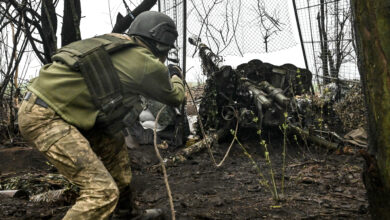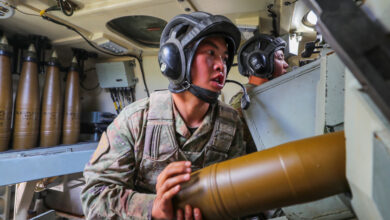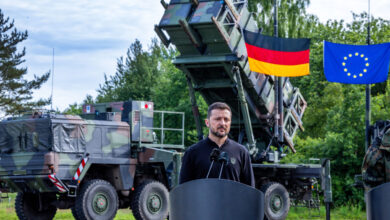
As the October 15 deadline for a Russia-Turkey deal for a demilitarized zone in the northwestern Syrian province of Idlib is approaching rapidly, the world braces itself for what could happen if the requirements of the deal aren’t fully met.
The agreement, which was reached between Turkish President Recep Tayyip Erdogan and his Russian counterpart Vladimir Putin last month in Sochi, was to avert a Syrian regime offensive on Idlib – the last main rebel stronghold in Syria.
One major point of the agreement stipulates that “all radical terrorist groups will be removed from the demilitarized zone” by October 15.
But thus far, only one group – the National Liberation Front, an umbrella group of Turkey-backed rebels – has complied with the agreement by withdrawing its heavy weaponry from the buffer zone.
The largest jihadist group, Hayat Tahrir al-Sham (HTS), formerly known as al-Nusra Front – al-Qaeda’s Syria branch – hasn’t yet responded to the agreement. In 2016, the radical group said it had severed ties with al-Qaeda.
HTS and other jihadist factions control more than two-thirds of the proposed demilitarized zone. Their outright refusal to leave the area means the agreement would utterly fail and thus leave the door open for all options, including a military operation.
Syrian President Bashar al-Assad’s regime says that retaking Idlib from rebels is inevitable. In fact, the Russians too have been up front about the eventual return of Syrian regime authority to all territories controlled by rebel forces.
Assad and his regime have always viewed the Russia-Turkey deal as provisional.
In a recent meeting of the central committee of the ruling Baath party, Assad said: “The agreement is a temporary measure through which the state has realized many achievements on the ground, starting with stemming the bloodshed.”
That’s why the deployment of forces loyal to the Syrian regime to areas south and west of Idlib continued even after the ceasefire agreement was announced.
Consequently, fears of a humanitarian catastrophe that were averted only a few weeks ago, would most certainly resurface once again. Over three million people live in Idlib, including many fighters and families resettled from other areas held by rebels.
So if things are not sorted out by the impending deadline, Syrian regime troops would be poised to launch its assault on Idlib. Russia, Assad’s staunch ally, would also be more inclined to resume its airstrike campaign in the province, using its old excuse of targeting only terrorist groups.
On the other hand, Turkey has dispatched additional reinforcements to Idlib over the past couple of weeks with the hope of pushing forward with the agreement. But if worst comes to worst, these Turkish forces would very likely be in a direct confrontation with Syrian regime forces.
Turkey wants to maintain a military presence in Idlib, in addition to its 12 observation points that have already been set up as part of a de-escalation agreement between Iran, Russia and Turkey last year. So Ankara will stick around in that part of Syria, even if that means having to violate its understanding with Russia.
Another dangerous ramification that might emerge from the failure of the Idlib agreement is a new face-off between Turkey and the United States in northeastern Syria.
Turkey has repeatedly expressed its intention to invade more territory in northern Syria – particularly areas controlled by the U.S.-backed, Kurdish-dominated Syrian Democratic Forces. By doing so, Ankara hopes to exert more leverage on any military dynamic changes in Syria that could result in if the agreement in Idlib failed to proceed.
In other words, the Turkish government wants to remain relevant on more than one front in the Syrian conflict.
By threatening to enter Kurdish-held areas, Turkey thinks it would kill two birds with one stone: remind the Kurdish forces that Turkey is always on the lookout for their ambitions to create an autonomous region in northern Syria, and also to tell the powers involved in Syria that Turkey can’t be overlooked when it comes determining the outcome of the war.
All such predictions will come to an end next week when the deadline in Idlib is past. Regardless of how things unfold thereafter in the flashpoint province, the consequences will undoubtedly be a major factor in impacting the trajectory of Syria’s seven-year conflict.

Sirwan Kajjo is a journalist based in Washington, D.C., and a fellow at the Middle East Center for Reporting and Analysis.
He writes extensively about Syrian and Kurdish politics.
Follow him on Twitter: @SirwanKajjo.
All views and opinions expressed in this article are those of the author, and do not necessarily reflect the opinions or positions of The Defense Post.
The Defense Post aims to publish a wide range of high-quality opinion and analysis from a diverse array of people – do you want to send us yours? Click here to submit an Op-Ed.











